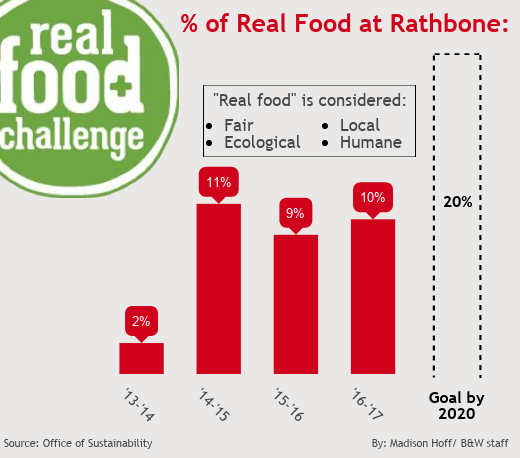During Rathbone’s Real Food Challenge Dinner on April 19, all food was served in its most natural form.
A student asked Rathbone’s executive chef Joe Kornafel, “What is in the grits?”
“It’s just seasoned with salt and pepper and cooked in water,” Kornafel said.
“No, there has to be something else. What else is there?”
“No, that’s it.”
Options at the Real Food Challenge Dinner included kale from a nearby farm, catfish from the Wide Net Project, free-range turkeys and cage-free eggs. One student said they wished this kind of food was available everyday.

Contrary to popular belief, it is.
“We do have it,” Kornafel said. “We just don’t have the menu 100 percent dedicated to it everyday or have all the posters all over the place.”
Though President John Simon signed Lehigh’s ‘Real’ Food Campus Commitment in November 2017, the university has unofficially participated in the effort since 2012. Lehigh pledged to increase its purchase of real food — food that is local, fair, ecological and humane — to 20 percent by 2020.
The Real Food Challenge Dinner celebrated the university’s commitment to this growing trend in foodways.
“Food is always going to be better quality when it is more local and fresh,” Kornafel said.
Members of Lehigh Dining and the Office of Sustainability believe there is potential in meeting the real food goal before 2020. To help meet the goal, Rathbone’s dining staff is discussing using local chickens raised under humane conditions.
“(This) can be a major push to getting to that goal very quickly, because the amount of poultry on campus in general is a lot, so it can really make a difference,” Kornafel said.
Lehigh’s biggest food distributor is The Common Market, a non-profit regional food distributor. According to its website, The Common Market connects communities with food from sustainable family farms. Lauren Sleeger, the director of Dining Services at Rathbone, said working with The Common Market allows Rathbone to get the variety and quality of food it needs to adequately serve all students — something that was difficult in the past.
Lehigh Dining can incorporate locally grown and produced food in its menus because of the large amount of agriculture grown nearby. Kornafel said local farmers are happy to work with Lehigh because it allows them to feel more economically stable.
Last year, Rathbone alone purchased over 25,000 pounds of local food from the Common Market. The non-profit is expanding because it is seeing a growing interest in real food. Sleeger said Rathbone is part of that change.
Delicia Nahman, a sustainability officer for the Office of Sustainability, said other universities are impressed with how various groups at Lehigh are working together to bring real food to campus.
“I think that Lehigh is really fortunate to be as cohesive and collaborative in making as much progress as we’ve made,” Nahman said.
Nahman said students are welcome to inquire about the quality and original location of their food.
“They want to know before it gets to Lehigh, how far does it travel and who is harvesting it,” Nahman said. “I’ve seen that trend of interest (grow since) I have been at Lehigh.”
In a survey of 87 Lehigh students, a majority reported they wanted some or a lot of improvement in the variety and quality of food in the dining halls. In another survey with approximately 185 respondents, the majority of Lehigh students fell short of nutritional guidelines from the American Heart Association.
The result did not indicate that the various food groups are not offered at Lehigh. Instead, it revealed that students are not choosing to eat food with the most nutritional value.
“We (have) to give a very balanced menu for all dietary needs because all students are different,” Kornafel said.
After Rathbone’s renovation last year, foods that had a higher fat content or were less fresh were moved to the back of the dining hall. Healthier foods and vegetarian and vegan options were moved to the front.
Kornafel said there is plenty of food to choose from — it is just a matter of perception and students’ willingness and ability to seek out the foods they need.





Comment policy
Comments posted to The Brown and White website are reviewed by a moderator before being approved. Incendiary speech or harassing language, including comments targeted at individuals, may be deemed unacceptable and not published. Spam and other soliciting will also be declined.
The Brown and White also reserves the right to not publish entirely anonymous comments.